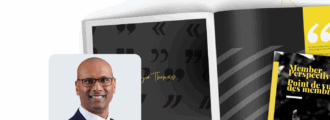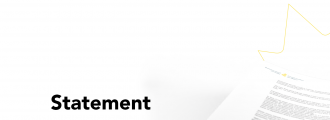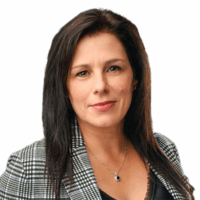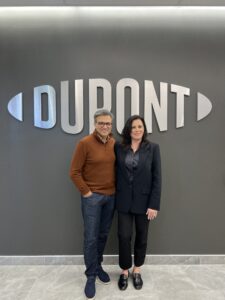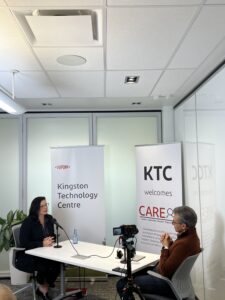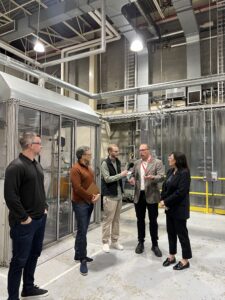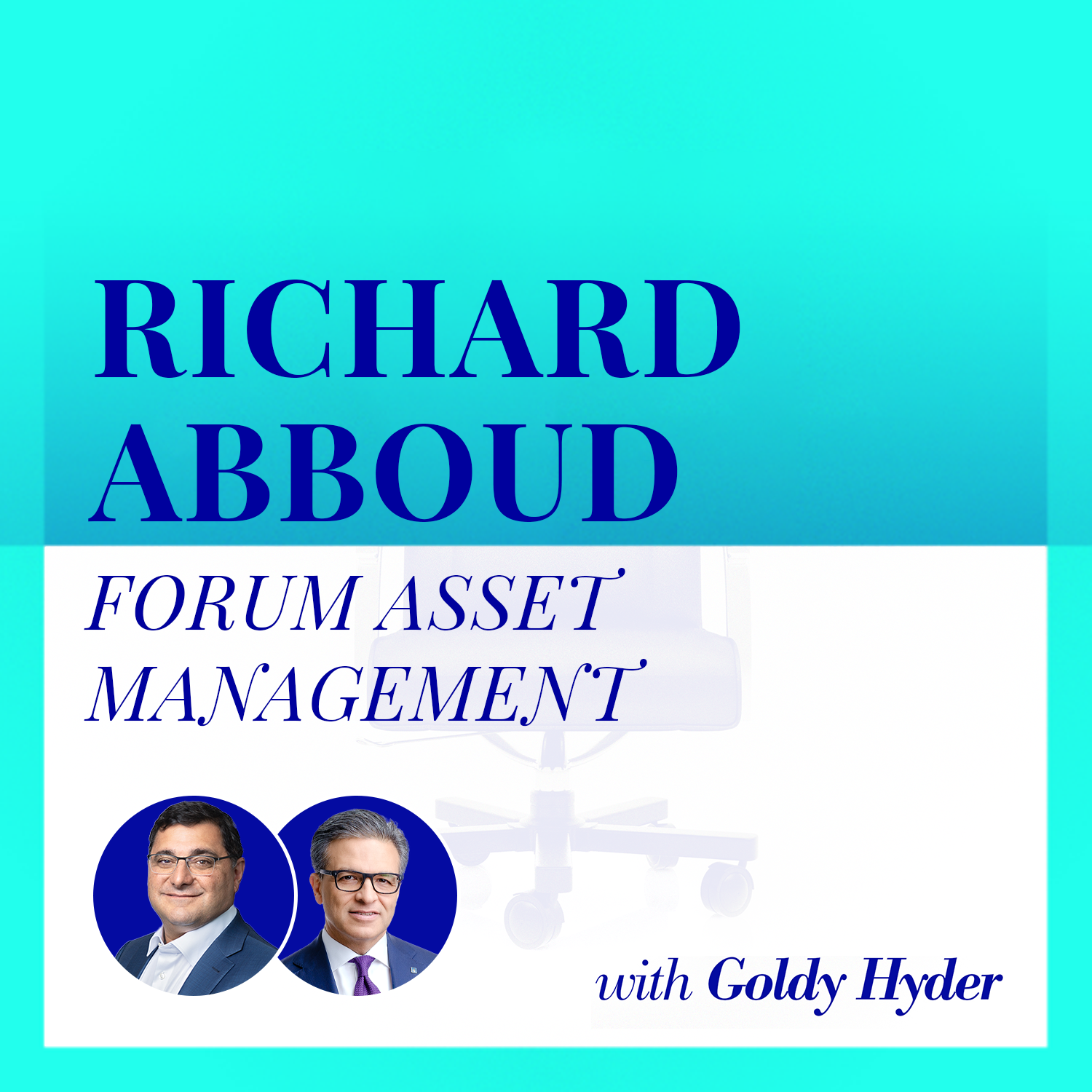In the latest episode of Speaking of Business, Wendy Andrushko, President of DuPont Canada, takes host Goldy Hyder on an insider’s tour of the Kingston Technology Centre, a facility that’s quietly shaping the future of electronics, sustainability, and advanced materials.
From semiconductor research to green chemistry breakthroughs, the Kingston, Ontario site is more than a lab, it’s a launchpad for commercialization. World class researchers are “inventing things, piloting things, figuring out how to scale it to ultimately commercialization,” Andrushko explains.
What makes the Kingston facility stand out in a crowded field of research? And how is Canadian innovation punching above its weight? Find out by listening to the full conversation.
Wendy Andrushko:
We do things that matter. We do things, we make things that make a difference in people’s lives.
Goldy Hyder:
Welcome to Speaking of Business, conversations with innovators, entrepreneurs and leaders.
I’m Goldy Hyder, president and CEO of the Business Council of Canada.
Today I’m at DuPont Canada’s Kingston Technology Centre. Located on the beautiful shores of Lake Ontario, this facility is an innovation hub. Here, world class researchers are developing, testing and scaling new technology that is used around the world.
Wendy Andrushko is DuPont Canada’s President and has invited us for a tour of the centre.
Good morning, how are you Tina?
Our tour guide is Jeff Downey. He’s the site director here and began our tour with a safety briefing.
Really strong safety culture here within DuPont. DuPont has the origins in the explosives industry and gunpowder, so a very long history of safety.
We will be going between floors. Slips, trips and falls is one of the major health and safety related incidents across DuPont and other industries for that matter, so as we go up and down the stairs, grab the handrailing.
As we go into the operating areas we will fire on our safety glasses. If you see an orange line on the floor as you step over that orange line that’s when you’ll want to have your safety gear on.
I found out first-hand how serious DuPont is about their safety culture, when Wendy scolded me for looking at my phone.
Believe it or not one of our safety rules is not to walk and text. Oh really? OK hold my hand while I’m doing this. OK I will. ha ha ha ha
The Kingston Technology Centre attracts scientists from across the country and around the world. Many of them are innovating and problem-solving in some of the facility’s high-tech labs. Currently, there’s a focus on semiconductor research.
This is our ICP lab. And as you can see, we try to maintain a really high level of cleanliness and we go so far as to do even the smallest things about having an automated Roomba system to clean up the dirt from peoples’ shoes. We’ve got a lot of different stuff to keep this room clean because that is really the name of the game is to keep this clean so that for the ICP which is Inductively Coupled Plasma Spectroscopy can actually detect really really low levels of materials and metals for all of the samples that we put through it.
Of course, lab work alone will only get you so far, which is why the Kingston facility works to commercialize the innovation developed here.
So we were upstairs in the laboratories. More traditional laboratory environment. As we start to move down through here, one of the main focuses of this centre is that process scaleup, that scaleup towards commercialization, what does the path to commercialization look like and what do we do to derisk along that pathway.
It was such a thrill to see the cutting-edge work being done here in Kingston.
After our tour I sat down with Wendy to talk about it in greater detail.
Here’s our conversation.
Goldy Hyder:
Thank you for doing this, Wendy. Great to see you.
Wendy Andrushko:
Great to see you. Thank you.
Goldy Hyder:
We’ve had this amazing tour at the Kingston Technology Center. Tell us about it.
Wendy Andrushko:
Yeah. This is an amazing place focused on our technology. They essentially are inventing things, piloting things, figuring out how to scale it to ultimately commercialization.
Goldy Hyder:
Now you have an international footprint, so labs like this would I assume exist in different places. You have to certainly make the case for investing here in Kingston. What makes this facility special?
Wendy Andrushko:
There’s really three things. One, it’s the people. We have a great team of people who are super resilient, super able to adapt. And then two, it’s the culture. We have an amazing culture. We collaborate internally, externally, and we use that to solve problems, and our team is always looking to solve problems. And then third, it’s really our process. It’s how do we actually do the work? So we projectize everything, and because we projectize everything, everybody on the team understands where we are, and as a result of that, we can focus on the technology.
Goldy Hyder:
Let’s educate the listener about DuPont. It’s a global brand. People know the brand, but you know what? They probably don’t understand the breadth and depth of the things that you do. You mentioned earlier, you’re behind the milk bags that we take out of our fridge and put it in a container every day and snip off the little top of it. You’re, what, 200 million phones around the world, every time someone touches their screen, they’re touching something that DuPont would’ve participated in putting together.
If you’re fighting fires as sadly so many firefighters are doing across many parts of Canada, the attire that they wear makes them safer and secure, driven by technology and products made by DuPont. If you’re an F-1 race car driver, you’re wearing an outfit that again is affected by that. There are just so many things that you do.
Wendy Andrushko:
Exactly Goldy. We really see our innovation as the driving force behind everything we do.
Goldy Hyder:
How does that feel? You’ve done all of these great things.
Wendy Andrushko:
It’s amazing. So actually, this year I celebrate, or this week actually, I celebrated 35 years with the company, and what gets me coming to work every day is really, it’s the people. It really feels like a family and you had a great chance to interact with some of our team. We do things that matter. We do things, we make things that make a difference in people’s lives, and so that really motivates me every day to get up and come to work and ultimately make a difference.
Goldy Hyder:
But that making all starts because you have this innovation center, and an innovation center based in Kingston, Ontario, Canada. And I must say, as you gave us the tour, all I was feeling was this sense of pride that wow, this little area and this little city in a massive country is having global impact. How are you doing that? You mentioned people. Tell me about the people here. Who are they? Where do they come from?
Wendy Andrushko:
Actually, our teams come from all over the world and all over Canada. We have PhDs, we have chemists, we have engineers, but we really look to hire the best and the brightest, and so it’s really an interesting place. And when you think about it, this year, we actually celebrate 70 years as a facility, but one of the things that’s been so special is this team has just continued to evolve how it operates. If you think about the days, ultimately, DuPont started in 1954 as CIL and DuPont actually split into two different companies, so DuPont Canada was created at that time, and the Kingston Technology Center really opened a year later. And what was really cool is at that time that they were working on technology and scale-up as it resulted to Nylon, and today our organization is focused very significantly on our electronics business which many people may not totally know that we’re one of the largest electronics material companies in the world.
Goldy Hyder:
So all of the good work that goes on here with this small operation of 200 people, a global technology center that is Kingston, in the big scheme of things, for a multi-billion-dollar company like DuPont, which I think is over 10 to 12 billion dollars U.S., what kind of an impact does the work here have on the company’s big picture?
Wendy Andrushko:
Yeah, so we are scaling products to commercialization all across the company in many of our product lines, but what I think is super exciting is that the work that we do here contributes to a billion Canadian dollars worth of value around the world. So by far, we punch above our weight, and it’s something that we think about every day is how do we continue to contribute more based on what we do here? So pretty exciting.
Goldy Hyder:
You know a lot of things are keeping people up these nights. What keeps you up about the facility itself and making it achieve its full potential?
Wendy Andrushko:
One of the things, of course, is we’re always working on really strategic projects, and so the beautiful thing about that is we have lots of opportunities for strategic projects for DuPont. When you think about scale-up, we talked about this a little earlier, it’s a risky part of the process. You start with the technology, you create the pilot, you scale it to bigger quantities, and then ultimately you need to create data packages to scale it for production. And so because we’re the only facility within DuPont who actually specializes in scale-up the way that we do, we have great demand for our teams and our processes and ultimately the results that we produce, which is pretty cool. But bottom line, we compete for capital like any company does, and so it’s really-
Goldy Hyder:
It’s so important for people to understand that, that it’s not an automatic that DuPont will invest in Canada. We have to give them reason to.
Wendy Andrushko:
Exactly. So the SR&ED tax credit is really important for us because we are an R&D facility working on science and innovation, and in 2012 when they made the change to ultimately reduce what went into that certainly made a difference. I think they shifted from 20 per cent to 15. Some of the capital’s not allowed, some of our partners that we might use, again, those costs don’t qualify any longer. When you think about R&D and innovation, we absolutely have waste that comes through our process that we need to treat responsibly. None of that’s allowed in the process. So I think just continuing to look at how we go back to the credit level, it went from 20 per cent to 15, getting that back up there and really looking at how do we encourage innovation in the country? Because scaling to commercialization is risky and it’s really an area where that level of support if we want to drive innovation in Canada from Canada.
Goldy Hyder:
In this era of populism, there’s always this desire to rip down the successful or take down the business community, the big business and all of that. I want to make sure that our listeners understand that when you say, “I need support of government,” like a subsidy or whatever the case might be, you probably wouldn’t have needed if no one else was doing it. But the reason you need it is because?
Wendy Andrushko:
Yeah, if you look around the world and you look at the electronics industry, countries are hungry for investment that goes into the electronics industry. It’s a high growth business. It’s obviously critical for our future as a world, and so that’s what we compete against is other countries who are deep in the electronics industry. So it’s important for us if we want to continue to focus in those areas.
Goldy Hyder:
Well, given where you started your career, which was primarily being educated in business, I think I read somewhere you now wish you’d paid more attention in chemistry class. Let’s go back that 35 years ago as you mentioned. Tell me about your first job here.
Wendy Andrushko:
I went to the University of Toronto. I took business. I focused in accounting, economics, organizational behavior, psychology, and I really didn’t know what I wanted to do. And I thought, oh, okay. Well, I had worked for a bank throughout university to actually pay for my school, and I thought about staying at the bank. I thought about working on Bay Street because I liked derivative securities, and I really didn’t know what I wanted to do. And in fact, DuPont had a career fair at U of T which I went to and I thought, “Okay, I’ll check it out.” So I got an interview, I spent the day with the team and I loved it. I loved the fact that it was a global company working in multiple industries.
I actually started as a customer service rep in our Corian solid surface business. So you may be familiar with Corian, but I loved it. I loved servicing the customer. We had a base in the West and I loved making sure they felt cared for. It was really a great place to learn everything about the company and the business because I worked with all functions to be able to ultimately deliver our products to our customers, and it was a great training ground, and to this day, I take with me a passion to serve our customers and to serve the people I work with.
Goldy Hyder:
Did you ever think 35 years ago, you’d be in this one company for your whole career and end up as the head of the whole operation?
Wendy Andrushko:
No, I didn’t. I wasn’t one of those people who left university knowing what I wanted to do. It’s really about the people. We have an amazing group of people that we work with. It feels a lot like a family. I’ve really had the pleasure of working in different businesses for DuPont, and I’ve also been able to travel the world, meet people, work in many different countries, all from Canada, which is a little rare, but it was amazing. So I feel very privileged to have done that, and like I said, what’s kept me here for 35 years, we have amazing core values and those core values are our safety, protecting the planet, ethics, operating ethically and respecting people, and I love to get up and work in a company where we impact people and how they live every day because of the products that we make.
Goldy Hyder:
Well, when you think about values, yeah, they’re all in corporate speak and the walls and all of that, but our values are really set a lot earlier in our lives and I want to talk a little bit about your mom and dad. Your mom was a nurse and your dad was in the security business. Tell me about what you learned from them. What did they teach you that allows you to become who you are?
Wendy Andrushko:
So my mom was a nurse manager in a continuing care ward. So these are folks who are in the hospital and have all sorts of challenges, and one of the things that I really respected about my mom when I would visit her is she could take the time and would take the time to listen to people and really understand what they were saying, even when it wasn’t easy to understand what they were saying. Many of them couldn’t speak well, they might’ve had a trach tube or just issues and how they communicated, so it really taught me about listening and engaging with the people that you’re with. She has an amazing resilience. When you think about working in an environment like that, it’s challenging, so she just had this amazing care for her patients and ultimately this amazing resilience, and I think that’s just so important in business today, listening, engaging, and ultimately working respectfully with the people that you deal with every day.
From my dad, as you said, he started actually in air traffic control. He ultimately moved into the security business. He worked for a big Canadian bank, making sure that the vaults and ultimately how the security of the bank was set up, and from him, it was really about systemic thinking, thinking about risks. What’s the plan B? How do you think through a process to make sure that it’s well taken care of? So that sort of strategic thinking, systemic thinking was also something I really learned from him. So when I often think about, I really was almost destined to work for DuPont when you think about our culture, caring for people, doing things that make a difference in this world.
Goldy Hyder:
Precisely, systematically.
Wendy Andrushko:
Yeah, systematically with an amazing process.
Goldy Hyder:
Well, thank you for sharing that. As I said, I think we sometimes forget that we’re shaped and formed more by our family than we are at work, and then when you get to the work, hopefully you bring some good stuff that you learned there. You mentioned the values of the company. I want to hone in on one specifically because it is a subject of a lot of discussions and has been occupying a lot of our discourse nationally, globally, and that is of sustainability itself. How are you putting protecting the planet, a big value, into practice?
Wendy Andrushko:
So as we talked about, it’s one of our core values. We’ve committed to 2050 essentially being net zero, but it takes everybody being involved. So if you think about our manufacturing sites, they’re working on how do we continuously improve processes to deal with waste? You saw it today, when you work in our technology environments, you’re working on not only cost and performance, but you’re ultimately figuring out how to use less GHGs, less water. You look at our sales teams, they’re focused on our value chains and ultimately what do they need to be sustainable? So it’s something that we all embrace really every day to be able to deliver on it.
Goldy Hyder:
Now, you serve on the board of the Business Council of Canada, so you and I and our board and others in our membership have talked a lot about some of the challenges we face doing business in Canada, particularly that we get in our own way a lot. The topic du jour, who would’ve thunk this on their bingo card, but everybody’s focused on interprovincial trade barriers. Given the lines of businesses you have, the diversity of your business and the fact that it’s such a people business, and so how do you feel about regulations more broadly, and do you think we can actually use this moment to do something?
Wendy Andrushko:
I’m so hopeful based on what we’ve been hearing and certainly seeing. I think when you look at the challenges we face, so for example, you would experience this, what it takes to recycle in Kingston is different than what it takes to recycle in Ottawa and Southern Ontario. All the rules are different. So we have products that we ultimately get recycled and then trying to figure out how to actually… We need to get involved in each municipality, with each rule to try and figure out how do you actually manage that, so that’s to me a great example in this extender producer responsibility. If we could come up with an ability to have one process through the country or even the province, we could be more successful in those areas. So this idea of trying to streamline, even when you’re shipping something from one side of the country to the other side of the country, if you’re in situations now where you have to change or ultimately deal with whatever the-
Goldy Hyder:
Transportation requirements.
Wendy Andrushko:
Yeah, the most strict transportation requirements are.
Goldy Hyder:
Personal favorite is the first aid kit. You have to prove that you have the first aid kit that qualifies in this province versus the one you just left.
Wendy Andrushko:
Right. Those are the areas where I think if we can come together as provinces and the federal government, we can make a really big difference and that will ultimately impact our cost, our productivity, and our ability to be competitive.
Goldy Hyder:
And what customers pay for things.
Wendy Andrushko:
Absolutely. Yeah, absolutely.
Goldy Hyder:
The other thing that, again, being in a place where innovation is your heart and soul of what it is that you do, there’s a sense that Canada doesn’t commercialize or scale very well. What do we do about that?
Wendy Andrushko:
It’s certainly ensuring that we have the right infrastructure, ensuring we have the right capability, ensuring that we have the right processes and expertise. I would say it is an expertise to scale and ultimately commercialize something. I think the other area to really work closely together is with academia. When you think about our universities have great ideas, but they don’t go to commercialization many times because they don’t have the infrastructure needed, which might be working with a company on a problem that really matters that you then partner between academics, companies like ourselves, the government to ultimately get it to the marketplace. So I think there’s a real opportunity for partnership to be able to bring together those different groups to be able to ultimately drive and keep innovation and ultimately scale up in the country.
Goldy Hyder:
How do we keep more things in Canada? It’s not a protectionist measure. It’s just you want to get more value for your innovation.
Wendy Andrushko:
I really do think we need to figure out how to focus on the areas that we’re strong in. I know we’ve talked a lot about this at the Business Council, whether it’s some of our natural resources, whether it’s the areas that we can ultimately take and lead from this country and make sense. So let me give you an example. Our teams here are all trained in what’s called green chemistry, which is really looking at chemical processes and formulations to eliminate hazardous products and really focus on sustainability, safety and efficiently working. So we had a project led from here where we were using a hazardous material or the process called for a hazardous material, and this team was able to ultimately discover or use a non-hazardous, naturally occurring product, so a dramatic change in the footprint.
And then ultimately, while they were doing that, we were able to work on the process and reduce 50 per cent of the effort and the process steps to be able to create the product. So in this example, not only is it more sustainable, but it’s ultimately a more effective, cost-effective process with better results.
We were able to deliver value, performance, but also be sustainable in how we did that. And so when you think about Canada, our natural resources, the areas where we’re naturally strong, I think there’s a real opportunity to take advantage of that to be leaders, to be leaders around the world. We’ve got processes and products that are sustainable compared to other parts of the world, and figuring out how we ultimately have that move from here somewhere else really allows us to impact their handprint while using our more sustainable footprint.
Goldy Hyder:
DuPont is headquartered in Delaware.
Wendy Andrushko:
Yep. Wilmington, Delaware. Yep.
Goldy Hyder:
Let’s deal with one of the elephants in the room, in every room we go into these days is this issue of the desire of President Trump to bring manufacturing back to the United States of America. Now, you operate four facilities that are here in Canada. Any risk of any of those being lost to the United States with the pressure coming from there?
Wendy Andrushko:
Well, when you really think about it, we have been around for as long as we have, seventy-plus years, because we focus on our customers and we really bring our capacity and capability to ensure that we’re delivering value. We have manufacturing facilities all around the world that are differentiated, and we’re really focused on what is it that our customers need and where are those sites positioned to be able to deliver value to the customer and ultimately our shareholders? There’s a lot of dynamics going on right now, so we are certainly focused on what do we need to do short-term to ensure that we’re operating effectively, but we really do try and focus on the long-term and ultimately executing against our strategies.
Goldy Hyder:
Not to put words in your mouth, but I didn’t hear you say, “No, no, we’re going to be here forever,” because it is about being competitive, isn’t it?
Wendy Andrushko:
Yeah. It’s about being competitive, it’s about delivering value. It’s about differentiating what we do in our company.
Goldy Hyder:
Do you see one of the opportunities, especially in the space of innovation, given what’s going on in America, particularly in American campuses, especially if you’re an Ivy League campus it seems, to attract the talent? Much of that talent is very global. Is this not an opportunity for Canada to really double down on making sure we’re getting the right people who bring the talent, who bring the work ethic, who bring the longevity of working hard, paying taxes, being good Canadians along the way?
Wendy Andrushko:
Absolutely. I think I mentioned to you that at one time, we had 57 different countries represented at this site, so we really are looking for, like I said, the best and the brightest no matter where they come from and we certainly actively recruit from universities, and we have many folks, you met some today, who have come from other parts of the world. So I do, I think the area as well, because as you saw, our facility, we do scale-up but we can scale what we do at this site, so there is opportunity for us to continue to grow in the impact that we have for DuPont to take advantage of our ability to hire talent and move projects and strategic work to the country if we’re competitive and can ultimately deliver that differentiated value.
Goldy Hyder:
You and I, we’ve talked about this issue because it’s very important to the Canadian economy to have workers, to have the right workers, to have the right talent so they can be homegrown. We’re just not making enough babies to bring out that talent or to grow that talent, so we do need to rely more broadly on immigration. Let’s be honest, the generational consensus on immigration is under attack. How much does that worry you that if we miss out on that talent at this moment, that it would set us back in the long run?
Wendy Andrushko:
When you look at what we’ve been experiencing, and I think where some of the sentiment comes from is do we have the infrastructure to be able to take care of the folks that are coming to our country? And so I’m hopeful that that’ll be an area that the provincial and federal government will come together to figure it-
Goldy Hyder:
A lot easier if you’re growing your economy, which we should be working on.
Wendy Andrushko:
Right, exactly. We absolutely need to do that, but I’m hopeful that we’ll figure that out, because I think immigration, it’s super important as we want to bring the best and the brightest, and of course we have an amazing education system in Canada and we obviously have lots of terrific people who graduate from those universities that we want to be able to hire, so yeah, we need to keep the right immigration moving forward in the country, and I feel optimistic that we’ll continue to do that. And I think it’s certainly an opportunity for us in Canada as the geopolitical climate is changing, and I think it’s an opportunity for us to take advantage.
Goldy Hyder:
Many have described it as our secret sauce.
Wendy Andrushko:
Absolutely.
Goldy Hyder:
That for all the emphasis we put on natural resources, the ability to have the right human resources, and you’re right, there are legitimate issues, legitimate concerns by not only Canadians, by immigrants who come here who are saying, “Hey, I was promised certain things that I don’t have here either.”
Wendy Andrushko:
That’s right.
Goldy Hyder:
So we’d need to sort that out for the reasons that you described. Well, urgency and uncertainty seem to be the words I hear most in the C-suite. How are you managing the uncertainty that we’re experiencing here in our global situation, but let’s face it, in really the relationship we have in the United States?
Wendy Andrushko:
DuPont is an American company of which we’re a branch and so we’re working as a global company to figure out and navigate and it’s a little bit about what I talked about before. We’re certainly focused on the short term. If ultimately, we have a recession to work through, we’ve been there before.
Goldy Hyder:
So the tariffs are impacting you. Even if the things you’re doing here are science-based innovation, big picture.
Wendy Andrushko:
Yeah, absolutely. We’re certainly taking advantage of CUSMA, and we do have products that qualify for exemptions as a result of what they mean to either the economy or for critical applications.
Goldy Hyder:
And the president, say what you will, he’s making things exempt if they’re CUSMA compliant, so it’s an indication that there’s hope for the trilateral deal to be reviewed and renewed at some point in time, you would think.
Wendy Andrushko:
Yeah. No, that’s right, and I feel that part of what we’re doing is it’s just all in many cases good business practice. Do you need multiple sources of supply? Yes. What do our supply chains look like? Ultimately, what makes the most sense for our customers, our shareholders, and ultimately the company? So we’re navigating, I think we’re navigating well. If we end up in a situation where we do have a recession to work our way through, we’ve been there before and we’ve certainly sorted through it. So we’re really focused on, okay, what are those short-term things that we may need to adjust? But again, ultimately, how do we stay focused on the future?
Goldy Hyder:
Now, many CEOs and many corporations, or of course, in fact, I’d suggest almost everybody I’ve met, has something that they care about personally and that they’re involved with in their community. You sit on the board of a charity called Dare to Be Youth. Tell us about that and why that is the choice that you made to invest your personal time in. Why is it important to you?
Wendy Andrushko:
So it’s a local nonprofit in the area that I live in, and they’re really focused on, so it’s for 14 to 24-year-olds, focused on resilience, leadership, and ultimately supporting youth to be able to develop those skills that you might not get in high school. As an example, they have an online course for financial acumen. When you think about that, you don’t always learn about bank accounts and cheques and what it takes to have good financial acumen as a student as you start out into the world. So they have some leadership programs, and when you really ultimately think of us as employers in this country, we need resilient youth. We need youth that want to give back to their community, that have strong leadership skills so that they ultimately become great employees and-
Goldy Hyder:
Maybe even CEOs.
Wendy Andrushko:
Yeah, right, exactly. And I think the other area too is when you think about mental health and the challenges that youth have come through through COVID, I just think it’s an area where we need to pay attention and how we’re bringing them back into more face-to-face stuff, interacting with people, ultimately learning the skills that they need to learn to be successful. So it’s been great and it’s a bit newer so we’re continuing to develop, but I think really has the potential to have a lot of impact on kids.
Goldy Hyder:
Well, they’re lucky to have you. Speaking of being successful and resilient and being a leader, you were recognized as one of Canada’s top 100 most powerful women. What did that mean to you?
Wendy Andrushko:
Yeah, it was really a tremendous honour. But you know what? It’s a tremendous recognition which I super appreciate, but it’s also a recognition of not only my hard work but the people I work with. You don’t do it alone, and so, yeah, I’ve been really honoured and I hope it’s inspiring to others to continue to just pursue what’s important to you and ultimately work hard and make a difference.
Goldy Hyder:
Linking these last two questions together, when we talk about young people, you’ve got kids, I’ve got kids, and we see a little less hope in their eyes. More anxiety, more concerns about their future, a lot more than we had when we were kids, if I could say. And now you’re also a grandma.
Wendy Andrushko:
Yes.
Goldy Hyder:
And by the way, you don’t look nothing like a grandma, so-
Wendy Andrushko:
Thank you.
Goldy Hyder:
But here you are, you’re a grandma. Tell me what you hope for your grandchildren.
Wendy Andrushko:
Yeah. So now, I was a girl mom. I’m now a boy Mimi, but I really want them to ultimately be able to grow up and pursue what they want to pursue, work on the areas that they want to work in, get the education that they need and want, whether it’s university education or ultimately a college or a trade. I want them to be safe. I want them to have ultimately an environment that they can live in that’s healthy and doesn’t have the tremendous impact of climate change, et cetera. So I think it’s all those things. I want them to be able to live the life that we’ve been able to live and enjoy in a country that-
Goldy Hyder:
Has it all.
Wendy Andrushko:
It really does. When you think about whether it’s culture, natural resources, people, food, music, a safe environment.
Goldy Hyder:
Geography.
Wendy Andrushko:
Yeah. When you think about how fortunate we are to have the whole country, whether it’s west to the east, it’s such a beautiful place to live. So I feel very privileged to live in Canada, be Canadian, and I just really hope my grandsons can grow up and take advantage of that.
Goldy Hyder:
Well, look, thank you for sharing. This has been a real delight to get the tour of the facility, to appreciate that here’s this amazing global impact technology centre based in Kingston, talented people, very well led. So that was the easy part of the interview. I have to get to the tough part of the interview now because we end with some rapid fire questions. You set this one up nicely. You talked glowingly about our country and its majesty and everything else, so tell me, where’s your favorite part of Canada?
Wendy Andrushko:
I really love the West. I love the mountains, I love the water.
Goldy Hyder:
Good answer. Play to your host, I like that.
Wendy Andrushko:
Yeah, exactly. No, I do. Newfoundland is such an interesting province to be in, but I do love the West. I love the mountains, I love the water.
Goldy Hyder:
All right. Favorite food?
Wendy Andrushko:
I really enjoy sushi, but in all honesty, I like anything with a good sauce.
Goldy Hyder:
Hot sauce?
Wendy Andrushko:
Not so much hot sauce, but a flavorful sauce.
Goldy Hyder:
I got to take you out for some Indian food one day. We’ll work on that hot part.
Wendy Andrushko:
Yes, I’d love that.
Goldy Hyder:
What music do you listen to?
Wendy Andrushko:
Everything, except probably not punk, but I enjoy all music. It depends on how I’m feeling, what I’m doing.
Goldy Hyder:
Any favorite artists, go-to? I’m feeling not so great. I need to be picked up?
Wendy Andrushko:
Well, actually, what I’ve been listening to lately has been Teddy Swims.
Goldy Hyder:
What are you reading?
Wendy Andrushko:
I am reading a book called Let Them by Mel Robbins. It’s a book all about really just how people impact you. Letting them be who they are and then deciding your response. It’s actually a really interesting book.
Goldy Hyder:
Nice.
Wendy Andrushko:
Yep.
Goldy Hyder:
How do you relax?
Wendy Andrushko:
I like to spend time with family, friends. I walk a lot, I enjoy a good movie, a good book.
Goldy Hyder:
Last question then, let me just ask you this. If you could look back in life, what piece of advice would you give your twenty-year-old self?
Wendy Andrushko:
Yeah, probably two things. One is to be a little more fearless and be willing to make some mistakes. That’s really how you learn, right? When you fail, you learn. And when you think about even being in this innovation center, it’s-
Goldy Hyder:
The whole concept comes from failure.
Wendy Andrushko:
Yeah. You fail and then you evolve. So I think that’s harder, and I think it’s harder for probably women in general. They don’t want to fail. They want to be perfect in what they do, and so I think figuring out how to fail and recover from that I think is really important. The second thing is networking. I think as I reflect on my career, getting external earlier really can have an impact. When you think of organizations like the CIAC, the Business Council of Canada, it’s amazing networks that you learn, you have tremendous ability to gain value from, and so I just think doing that earlier on in your career. I spent a lot of time working incredibly hard trying to make sure I was doing everything that I needed to do, and as I reflect back, getting more external I think would have been helpful.
Goldy Hyder:
Well, both are very good advice. I tell you, my favorite part of my podcasts and talking to CEOs is how every one of them acknowledges the role of failure in their life, and yet we know the next generation thinks it’s a straight line and it’s never a straight line, so thank you for that and thank you for just more broadly sharing. It is a great opportunity for young people to hear people who came in one day, 35 years ago, and here we are. Thanks for having us here, Wendy.
Wendy Andrushko:
Thank you.
Goldy Hyder:
Wendy Andrushko is the President of DuPont Canada.
If you’d like to see some photos and video from our tour of the Kingston Technology Centre, just go to our website: the business council dot ca slash podcasts.
Speaking of Business is a production of the Business Council of Canada. If you like what you hear, please subscribe or follow us, and leave us a review. We love to hear from you.
Our thanks to all the people at DuPont’s Kingston Technology Centre for welcoming us and showing us around.
And thank you to Will McIntyre and JP Davidson of Popup Podcasting for their production help on this and all our episodes.
Until next time, thanks for joining us.

